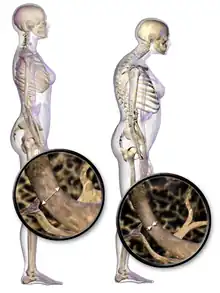| Juvenile osteoporosis | |
|---|---|
 | |
| Osteoporosis | |
| Specialty | Rheumatology |
Juvenile osteoporosis is osteoporosis in children and adolescents. Osteoporosis is rare in children and adolescents. When it occurs, it is usually secondary to some other condition,[1] e.g. osteogenesis imperfecta, rickets, eating disorders or arthritis. In some cases, there is no known cause and it is called idiopathic juvenile osteoporosis. Idiopathic juvenile osteoporosis usually goes away spontaneously.[2]
Also, child abuse should be suspected in recurring cases of bone fracture.
Cause
The causes of juvenile osteoporosis may be genetic, environmental, or indeterminate.
Diagnosis
Diagnosis is made by a physician, who will utilize several tests and procedures to make the diagnosis.
Treatment
Treatment for secondary juvenile osteoporosis focuses on treating any underlying disorder.[3] Treatment of Juvenile osteoporosis can also include maintaining a healthy lifestyle. This is accomplished by exercising, keeping a balanced diet of proper food and drinks, as well as keeping your body full of the necessary vitamins. If needed, Juvenile osteoporosis can also be treated by undergoing physical therapy.[3]
References
- ↑ "Great Ormond Street factsheet". Archived from the original on 2011-07-28. Retrieved 2009-03-12.
- ↑ NIAMS page
- 1 2 "default - Stanford Children's Health". www.stanfordchildrens.org. Retrieved 2020-09-12.
Further reading
- Manoj R. Kandol (2005). "Ch.14 Juvenile Osteoporosis". Clinical Aspects in Osteoporosis. Jaypee Brothers Publishers. pp. 427–. ISBN 978-81-8061-451-4. Retrieved 27 June 2013.
- Juvenile Osteoporosis - NIH Osteoporosis and Related Bone Diseases ~ National Resource Center